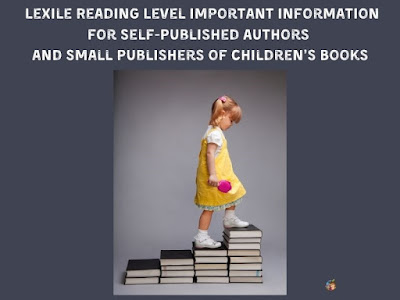Lexile
Reading Levels for Self-published and Small Publishers of Children’s Books
Did
you know children’s books should be “leveled” for reading classes? Yes, most
teachers and libraries check the Lexile level of books before purchasing. Why
is that? A Lexile level is an approximate reading level for a student, which
may vary from the grade level. You have
probably seen statements such as, “This book is recommended for children ages
6-8.” Publishers find age information is by having the Lexile level (https://lexile.com/) determined to include this information in their book
listings for authors on sites such as Amazon. It is easily found where the page
numbers, IBNs, and so on are found on book sales pages. Self-published and
smaller publishing houses may also take advantage of reading levels assessed by
the Lexile Framework for Reading. Authors may have to add Lexile levels to
Amazon and other online book descriptions themselves.

Lexile.com
is a rather extensive site and so here is an explanation of the different site
sections. A parent page, educator page, education companies & publishers,
and the departments of education page can be found using the menu. Also, books
may be looked up in the find a book area. Lexile level grade-level charts, an
analyzer, growth planner, Lexile career database, Wordlists, and a Measures
manager are included. Listening levels are a new feature on the site. Spanish
book levels are also available on the site.
Many
States Have Memberships for Their Residents
Because
reading levels are critical to student understanding and success, many states
have already joined the site. I live in Minnesota, and my membership is free. A
teacher friend of mine lives in New York and also has a free membership. The
annual cost is only about $18 if an author lives in a state without a
membership. Even with a free membership, though, the site offers an extensive
amount of information.
The
reasons authors should be aware of this site while writing includes the
following:
1.
An author may
copy then paste up to 1000 words in the analyzer to determine the Lexile level.
Full sentences should be entered before clicking the analyze button. A Lexile
level range will be given, although not certified and is only an estimate. The
overview column will list the longest sentence and recommended books at the
same level. The indicators column will include decoding, vocabulary, and
patterns. The vocabulary column will select up to ten words from the text that
can help inform instruction. See this page for more information. (https://hub.lexile.com/analyzer)
2.
Leveled word
lists may be downloaded from the site and used to inform authors as they write.
3.
If an author
creates curriculum or teacher resources for his or her book, the teacher
assistant area provides state standards. I can look up Minnesota state
standards. I have written two math storybooks and created student work pages
for them, so I check the math standards information.
4.
Lexile Tools for
Find a Book allow searching by author, keyword, ISBN, grade level (easy, just
right, and challenging), or by measure (a number) or a Lexile Range.
5.
When looking for
comp titles to submit a manuscript, this site is also beneficial for finding
such titles.
6.
Book level labels
may be downloaded for books placed on “my shelf” and printed, if interested.
The Most Important Reasons to Consider Using Lexile
Measures
However, an important reason for an author or small
publisher to use this site is to get their books leveled. I did so and received
levels for about $35 a book. For another $10, a vocabulary list is provided. At
the beginning of each book sales page description, I added the Lexile Level number
so teachers will see that first. Many teachers and librarians will look for
Lexile levels first thing.
The second important reason for authors or small
publishers to seek Lexile Levels is because the books are searchable online and
in school and library catalogs. A member may make a bookshelf on the site and
add books. I put the books I authored on
my bookshelf, although they may be searched by individual title. Links may be
shared in blog posts, social media, and press releases.
I hope you found this information useful!
Thank you for reading, Carolyn Wilhelm
Author
and Owner of The Wise Owl Factory
Carolyn Wilhelm is the curriculum writer and
sole owner of The Wise Owl Factory site
and blog. She has a BS in Elementary Education, an MS in Gifted Education, and
an MA in Curriculum and Instruction K-12. As a retired teacher of 28 years, she
now makes mostly free educational resources for teachers and parents. Her
course about Self-Publishing from the Very, Very Beginning is available on
UDEMY. Her children’s books are available on Amazon and Barnes and Nobel sites.


















